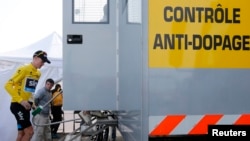PARIS —
A new report finds the world's leading cyclists took the banned blood booster EPO, including the top finishers of the 1998 Tour de France. The findings by a French Senate commission were released days after the wrap-up of the latest French Tour.
More than a dozen top cyclists tested positively for the banned blood booster EPO, based on retroactive analysis of their blood tests from the 1998 and 1999 Tour de France, according to the results of a five-month investigation by a French Senate commission.
The cyclists were named in the commission's hefty report, and include Marco Pantini of Italy and Jan Ullrich of Germany, who retrospectively finished first and second in the 1998 race.
At a press conference in Paris, commission member Jean-Jacques Lozach said the cyclists would not face sanctions. More to the point, the commission says, are its dozens of proposals to fight doping in sports.
In a separate interview on French radio, Lozach praised French rider Jacky Durand, who admitted to having doped before the report's publication.
Coming just days after the end of the latest Tour de France, the findings cast fresh doubt on world cycling. Since 1998, more than one-third of the top Tour finishers have admitted to using performance-enhancing drugs, including seven-time winner Lance Armstrong.
Armstrong, who has since been stripped of his medals and banned from the sport, has said it is impossible to win a Tour without doping. More recently, doubt has centered on the performance of the 2013 Tour winner, Briton Christopher Froome.
Lozach said suspicions about Froome were not justified today, but suggested those findings might change several years from now, using testing methods that do not yet exist.
Commenting on the report on France-Info radio, 1998 French rider Christophe Bassons described the heavy pressure to dope in the past. He said he quit professional cycling in 2001 because he refused to dope. Bassons said he believes cycling is cleaner today than in the past. But he believes doping still exists, and that it took place in the latest French tour.
Besides cycling, the report also looks at doping in more than a dozen other sports, including athletics, swimming and rugby.
More than a dozen top cyclists tested positively for the banned blood booster EPO, based on retroactive analysis of their blood tests from the 1998 and 1999 Tour de France, according to the results of a five-month investigation by a French Senate commission.
The cyclists were named in the commission's hefty report, and include Marco Pantini of Italy and Jan Ullrich of Germany, who retrospectively finished first and second in the 1998 race.
At a press conference in Paris, commission member Jean-Jacques Lozach said the cyclists would not face sanctions. More to the point, the commission says, are its dozens of proposals to fight doping in sports.
In a separate interview on French radio, Lozach praised French rider Jacky Durand, who admitted to having doped before the report's publication.
Coming just days after the end of the latest Tour de France, the findings cast fresh doubt on world cycling. Since 1998, more than one-third of the top Tour finishers have admitted to using performance-enhancing drugs, including seven-time winner Lance Armstrong.
Armstrong, who has since been stripped of his medals and banned from the sport, has said it is impossible to win a Tour without doping. More recently, doubt has centered on the performance of the 2013 Tour winner, Briton Christopher Froome.
Lozach said suspicions about Froome were not justified today, but suggested those findings might change several years from now, using testing methods that do not yet exist.
Commenting on the report on France-Info radio, 1998 French rider Christophe Bassons described the heavy pressure to dope in the past. He said he quit professional cycling in 2001 because he refused to dope. Bassons said he believes cycling is cleaner today than in the past. But he believes doping still exists, and that it took place in the latest French tour.
Besides cycling, the report also looks at doping in more than a dozen other sports, including athletics, swimming and rugby.




